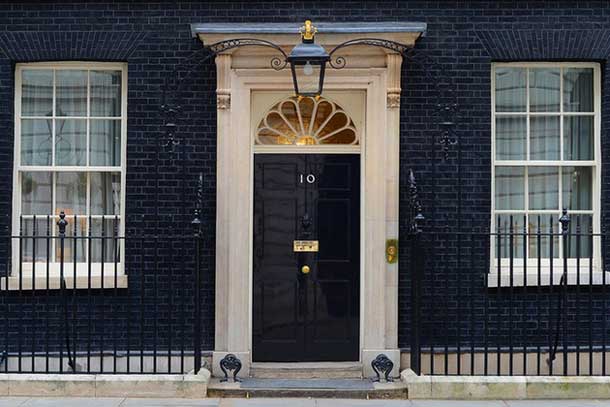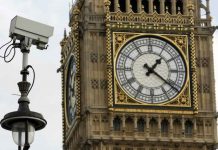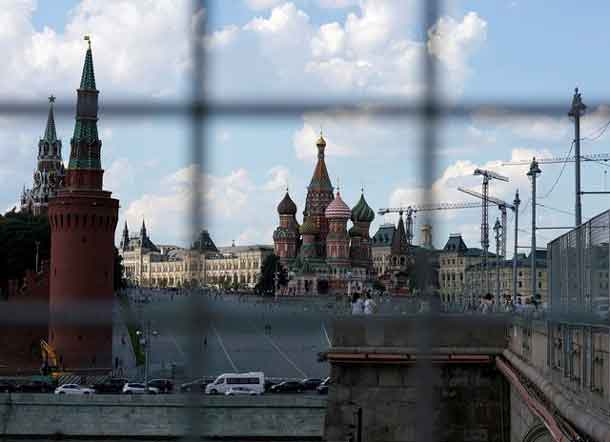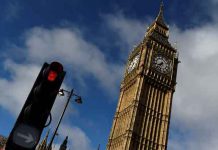LONDON – INTERNATIONAL NEWS – Britain is taking a new approach to protecting the country from domestic terrorism. On Monday Prime Minister David Cameron announced plans to strip suspected Islamist militants of their passports temporarily, to combat the threat posed by radicalized Britons returning from Syria and Iraq.’
The Prime Minister said, “It is abhorrent that people that declare their allegiance elsewhere are able to return to the United Kingdom and pose a threat to our national security.”
Speaking in the House of Commons, Prime Minister David Cameron issued this statement:
“I would like to make a statement on this weekend’s European Council, and on the measures we are taking to defeat extremism and keep our country safe.
First, on the Council, we agreed that Poland’s Prime Minister, Donald Tusk, should serve as the next Council President, and Italian Foreign Minister, Federica Mogherini, should become the next High Representative for foreign and security policy. Donald Tusk made clear in his acceptance speech that he places a high priority on addressing Britain’s concerns over the EU, and I look forward to working with him in his new role.
The Council spent most of its time focusing on the big international issues that have concerned us all this summer – the situations in Ukraine, Gaza, and the growing threat of ISIL in Iraq and Syria. I want to discuss each.
The presence of Russian soldiers on Ukrainian soil is completely unjustified and unacceptable. I met President Poroshenko before the Council on Saturday, and with our support he was invited to address the Council. The real cause of this conflict is Russia’s refusal to recognise Ukraine’s independence and sovereignty. Decisions on Ukraine’s political and economic relationships should be for the people of Ukraine and no one else, but Russia appears to be trying to force Ukraine to abandon its democratic choices at the barrel of a gun. In the last 2 weeks we have seen a dramatic stepping up of Russian military support to the separatists in eastern Ukraine, including Russian troops fighting on the ground. We know from European history the grave danger of a nation state being threatened and undermined in that way, so the European Council agreed that the economic costs it has already imposed on Russia must be stepped up if Moscow persists with those indefensible actions.
The Council was clear that new sanctions measures will be drawn up within a week. I do not accept the suggestion that sanctions are not having an impact. Capital has flown out of Russia, banks are short of finance, and the Russian stock market and rouble have fallen significantly. We have to show real resilience and resolve. Russia needs to understand that if it continues on the current path, its relationship with the rest of the world will be radically different in the future.
On Israel and Gaza, we have all been deeply saddened by the violence there and the dreadful civilian suffering it has caused, particularly to innocent children. The government have worked hard with our international partners to help bring about a sustainable ceasefire, and we warmly welcome the agreement reached in Cairo. The loss of life this summer has been truly appalling and the number of civilian casualties completely unacceptable – the life of a Palestinian child is worth the same as that of a child of any one of our nations – but support for a lasting settlement that includes a Palestinian state does not mean we should ever support the terrorist tactics of Hamas, which has rained down rockets on Israel and continually refused to accept ceasefires.
We will continue to support Israel and Israel’s right to defend itself, but that does not mean we support every decision the Israeli government take. Most recently, the appropriation of nearly 1,000 acres of land in the west bank near Bethlehem is utterly deplorable. Settlements are illegal under international law and will do nothing to create the kind of peace process we all want, and we urge the Israeli government to reverse this decision.
While I understand the many strong emotions around this tragic conflict, I am deeply concerned by growing reports of anti-Semitism on our streets in Britain. Let me be clear: we must not tolerate this in our country. There can never be any excuse for anti-Semitism, and no disagreements on politics or policy should ever be allowed to justify racism, prejudice or extremism in any form.
On the terrorist threat that we face in the UK, we have all been shocked and sickened by the barbarism that has been witnessed in Iraq this summer: the widespread slaughter of Muslims by fellow Muslims; the vicious persecution of religious minorities, such as Christians and Yazidis; the enslavement and raping of women; and, of course, the beheading of American journalist James Foley, with the voice of what seems to be a British terrorist recorded on that video.
The European Council conclusions could not be clearer:
“The European Council believes that the creation of an Islamic Caliphate in Iraq and Syria and the Islamist-extremist export of terrorism on which it is based, is a direct threat to”
every European country. On Friday, the independent joint terrorism analysis centre increased the threat level in the UK from substantial to severe, and we now believe that at least 500 people have travelled from Britain to fight in the region, in addition to 700 from France, 400 from Germany and hundreds more from countries including America, Canada, Austria, Denmark, Spain, Sweden, Belgium, the Netherlands and Australia.
The Council agreed to co-ordinate action in cracking down on those travelling to fight in Syria and Iraq and ensuring that all European countries are taking the necessary steps to tackle this problem of radicalisation. We should be clear about the root cause of this threat: a poisonous ideology of Islamist extremism that believes in using the most brutal forms of terrorism to force people to accept a warped world view and to live in a mediaeval state. And we should be clear that this has nothing to do with Islam, which is a religion observed peacefully and devoutly by more than a billion people and one that inspires countless acts of kindness every day.
To confront the threat of Islamist extremism, we need a tough, intelligent, patient and comprehensive approach to defeat the terrorist threat at source. We must use all the resources at our disposal – our aid, diplomacy and military – and we need a firm security response, whether that means military action to go after the terrorists, international co-operation on intelligence or uncompromising action against terrorists at home. Britain is already providing equipment directly to the Kurdish forces. We support US military air strikes against ISIL in Iraq, and we have secured a United Nations Security Council resolution to disrupt the flows of finance to ISIL, to sanction those seeking to recruit to ISIL and to encourage countries to do all they can to prevent foreign fighters from joining the extremist cause.
Alongside a tough security response, however, there must also be the right political response. We know that terrorist organisations thrive where there is political instability and weak or dysfunctional institutions, so we must support the building blocks of free and open societies. In Syria, that means a political transition and an end to Assad’s brutality, which has allowed ISIL to flourish. In Iraq, that must begin with a new and genuinely inclusive government capable of uniting all Iraqis – Sunni, Shi’a, Kurd, Christian and others – against the shared threat.
The NATO summit in Wales this week will provide an opportunity for us to review the effectiveness of the international response so far and to discuss what more we should do to help the region overcome the ISIL threat. Britain will continue to consider what further role is in our national interests, including any further diplomatic, humanitarian or, indeed, military measures we might take.
Let me turn to how we address the terrorist threat at home. We have already taken a wide range of measures, including stopping suspects from travelling to the region by seizing passports, barring foreign nationals from re-entering the United Kingdom, legislating so that we can prosecute people for all terrorist activity, even where that activity takes place overseas, and bringing forward emergency legislation, for instance to safeguard our use of communications data. We have also stepped up our operational response, with a fivefold increase in Syria-related arrests and the removal of 28,000 pieces of extremist material from the internet this year alone, including 46 ISIL-related videos.
But I have said all along that there should not be a knee-jerk reaction or the introduction of sweeping new blanket powers that would ultimately be ineffective. That is not what those who work so hard to keep us safe actually want. They want a targeted approach that reflects a forensic focus on the threat we face and that protects their operational independence and decision making. To achieve this, there are 2 key areas where we need to strengthen our powers to fill specific gaps in our armoury: preventing suspects from travelling; and dealing decisively with those already here who pose a risk. I want to mention both briefly.
First, on stopping people travelling in the first place, passports are not an automatic right. The Home Secretary already has the discretion to issue, revoke and refuse passports under the royal prerogative if there is reason to believe that people are planning to take part in terrorist-related activity. When police suspect a traveller at the border, however, they are not currently able to apply for the royal prerogative and so have only limited stop-and-search powers. To fill that gap, we will introduce specific and targeted legislation providing the police with a temporary power to seize a passport at the border, during which time they will be able to investigate the individual concerned. This power will include appropriate safeguards and, of course, oversight arrangements.
The House should also be aware that our current royal prerogative powers are being challenged in the courts. I want to be clear: if there is any judgment that threatens the operation of our existing powers, we will introduce primary legislation immediately so that Parliament, not the courts, can determine whether it is right that we have this power. I can announce today that we will start preparing the primary legislation and consult Parliament on the draft clauses.
As well as stopping people going, we must also keep out foreign fighters who would pose a threat to the UK. We already have important powers to block return: we can deprive dual nationals of their citizenship to stop them returning; we can bar foreign nationals on the basis of the threat they pose; and we legislated, in the Immigration Act 2014, to allow stronger powers to strip citizenship from naturalised Britons. But, of course, these powers do not apply to those who are solely British nationals, who could be rendered stateless if deprived of citizenship.
Some have said that we should deal with this gap by criminalising travel to certain individual countries or fundamentally changing our criminal burden of proof. The government are clear that it would be wrong to deal with the gap by fundamentally changing core principles of our criminal justice system. But it is abhorrent that people who declare their allegiance elsewhere can return to the United Kingdom and pose a threat to our national security. We are clear in principle that what we need is a targeted, discretionary power to allow us to exclude British nationals from the UK. We will work up proposals on this basis with our agencies, in line with our international obligations, and discuss the details on a cross-party basis. We are also putting our long-standing arrangements on aviation security around the world on a statutory footing. Airlines will have to comply with our no-fly list arrangements, give us information on passenger lists and comply with our security screening requirements. If they do not do so, their flights will not be able to land in Britain.
Secondly, we need stronger powers to manage the risk posed by suspected extremists who are already in the United Kingdom. The Home Secretary can already impose terrorism prevention and investigation measures on security grounds, including overnight residence requirements and internet restrictions, but the intelligence agencies and the police believe they need stronger powers to impose further restrictions, and the independent reviewer of counter-terrorism legislation, David Anderson, agrees. So we will introduce new powers to add to our existing terrorism prevention and investigation measures, including stronger locational constraints on suspects under TPIMs, either through enhanced use of exclusion zones or though relocation powers.
Dealing with the terrorist threat is about not just new powers but how we combat extremism in all its forms. That is why we have a new approach to tackling radicalisation, focusing on all types of extremism, not just violent extremism. This has included stopping the funding of organisations that promote extremism, banning hate preachers and ensuring that every part of government, from schools and universities to prisons, is focused on beating the scourge of extremism. As part of this, we are now putting our de-radicalisation programme, Channel, on a statutory footing. Anyone subject to our strengthened terrorism prevention and investigation measures will be required to engage with the Prevent programme.
We are proud to be an open, free and tolerant nation, but that tolerance must never be confused with a passive acceptance of cultures living separate lives or of people behaving in ways that run completely counter to our values. Adhering to British values is not an option or a choice; it is a duty for all those who live in these islands. So we will stand up for our values; we will, in the end, defeat this extremism; and we will secure our way of life for generations to come. I commend this statement to the House.”












